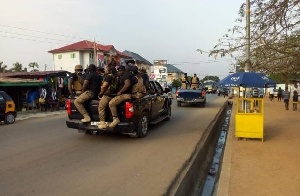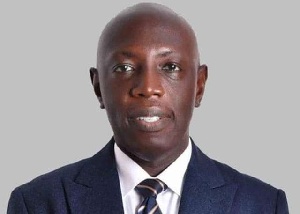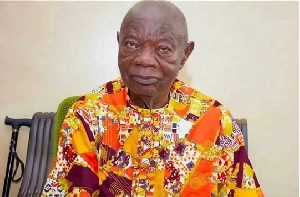- Home - News
- Elections 2024
- News Archive
- Crime & Punishment
- Politics
- Regional
- Editorial
- Health
- Ghanaians Abroad
- Tabloid
- Africa
- Religion
- Photo Archives
- Press Release
General News of Friday, 23 May 2025
Source: www.ghanawebbers.com
National Security Operatives, Bureau of National Investigations and Kaakaamotobi: Is the Legitimacy of Certain Security and Intelligence Institutions Under Further Threat? (Part II)
Understanding the Risks to Security and Intelligence Legitimacy
In part one of this opinion piece, I discussed the legitimacy of Ghana's security organizations. The National Security Secretariat and various intelligence agencies exist to protect the people. To do this effectively, they need trust from citizens. Without public cooperation, their effectiveness is compromised. Studies show a lack of trust in some state institutions.
The demographics of Ghana and Africa have changed significantly. Social media is now widely available and influential. Young people today are different from previous generations. They no longer fear state institutions as before. Instead, they use social media to express their views and demand accountability.
Recent movements like the Arab Spring and Nigeria's Stop SARS highlight this shift. Demonstrations will likely increase, testing security agencies' responses. Wearing Kaakaamotobi during these times may not help build trust. We must address the growing mistrust surrounding these practices.
Legitimacy is crucial for peaceful elections in West Africa. Security agencies play a vital role in ensuring elections are fair. In Ghana's last election, concerns arose over police wearing face masks to avoid intimidation claims. The National Democratic Congress (NDC) feared that civilians might impersonate officers to influence voters.
This mistrust between political parties complicates electoral processes in Ghana. Both NDC and New Patriotic Party (NPP) suspect each other of using security forces for electoral fraud. Improving the legitimacy of security agencies is essential for fair elections.
To address legitimacy issues within security institutions, we must work together on solutions. Engaging civil society and media can enhance oversight and accountability in governance.
Young people can significantly improve security legitimacy across Africa through active participation. Creating spaces for dialogue between authorities and citizens can leverage youth strengths effectively.
The old culture of projecting fear through Kaakaamotobi does not foster trust or efficiency in security organizations. If used at all, it should be limited to specific situations with strict oversight.
Citizens, especially youth, should educate themselves about defense issues like spending accountability and oversight tools such as the Defence Integrity Index or Security Sector Public Expenditure Review.
They should also familiarize themselves with relevant laws like Act 1030 regarding complaints mechanisms within state accountability frameworks.
Youth must assert themselves as key players in demanding accountable security agencies instead of waiting for invitations to participate actively.
Youth Parliaments can collaborate with media to prioritize these issues on various platforms while leveraging social media for reform efforts across Ghana’s security sector.
The case law Banful v AG (GITMO 2 case) deserves more attention as it addresses national security transparency issues clearly.
Judiciary oversight is crucial alongside Parliament and media roles in strengthening agency legitimacy.
A healthy relationship between power holders (officials) and citizens enhances overall governance quality within the security sector.
Wearing Kaakaamotobi amidst public distrust only reinforces negative stereotypes about these agencies’ intentions.
Security organizations must remember that legitimacy plays a vital role in achieving their goals within a democratic framework.
In conclusion, my aim is not to criticize but rather encourage collaboration towards better governance in Ghana’s security sector.
Many individuals within these organizations share similar views; they should share their experiences post-retirement to enrich discussions on governance reform.
I am concerned about why the National Security Council has expanded its operations into areas already covered by established institutions.
We must be cautious about creating overlapping operational units that could become unmanageable over time.
As an Ewe proverb warns: "Dzapata be deviwo menya ku o," meaning do not play with fire.
Ghana's democratizing security sector struggles with balancing legitimacy against coercion.
Civil society groups, youth organizations, academics, traditional leaders, and others should keep discussing Security Sector Governance at national levels.
Robust parliamentary debates on this topic are essential for effective oversight moving forward.
Let us remember that legitimacy arises from ongoing dialogue between power holders and citizens responding to authority claims.
I invite everyone—young people, women, men, academics—to engage further on this issue of oversight actively.
Written by Emmanuel Sowatey (PhD), Institute of Criminology,
University of Cambridge
Email: [email protected] / [email protected]
*Read Part I here: [Link]*











